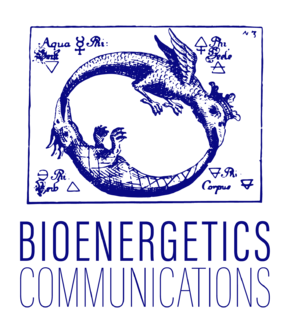Komlodi 2022 BEC: Difference between revisions
Tindle Lisa (talk | contribs) (Created page with "link=Bioblast_2022 {{BEC}} File:BEC-exlibris.png|right|290px|Bioenergetics Communications|link=https://www.bioenergetics-communications.org/...") |
(No difference)
|
Revision as of 12:52, 29 November 2022
| Komlódi T, Tretter L (2022) The protonmotive force – not merely membrane potential. Bioenerg Commun 2022.16. https://doi.org/10.26124/bec:2022-0016 |
» Bioenerg Commun 2022.16. ![]()
published online 2022-11-29 ![]()
Komlodi Timea, Tretter Laszlo (BEC 2022.16) Bioenerg Commun
Abstract: ![]() https://doi.org/10.26124/bec:2022-0016
https://doi.org/10.26124/bec:2022-0016
The protonmotive force pmF establishes the link between electrical and chemical components of energy transformation and coupling of oxidative phosphorylation in the mitochondrial electron transfer system. The electric part corresponds to the mitochondrial membrane potential ΔΨmt and the chemical part is related to the transmembrane pH difference ΔpH. Although the contribution of ΔpH to pmF is smaller than that of ΔΨmt, ΔpH plays an important role in mitochondrial transport processes and regulation of reactive oxygen species production. Measurement of both ΔΨmt and ΔpH allows for calculation of pmF. Methods for monitoring ΔΨmt such as fluorescence dyes are generally available, while determination of ΔpH is more challenging.
In this review, we focus on the application of the fluorescence ratiometric method using the acetoxymethyl ester form of 2,7-biscarboxyethyl-5(6)-carboxyfluorescein (BCECF/AM) for real-time monitoring of the intramitochondrial pH in isolated mitochondria. Knowing the intra- and extramitochondrial pH allows for calculating the ΔpH. Application of specific ionophores such as nigericin or valinomycin provides the possibility to dissect the two components of the pmF. We summarize the mitochondrial processes ― such as production of reactive oxygen species ― for which ΔpH plays an important role.
• Keywords: BCECF; intramitochondrial pH; matrix pH; ΔpH; mitochondria, mitochondrial membrane potential, ΔΨmt; nigercin; protonmotive force, pmF; reverse electron transfer, RET; safranin; triphenylphosphonium, TPP+; valinomycin
• Bioblast editor: Tindle-Solomon L
• O2k-Network Lab: HU Budapest Tretter L
Preprint
Labels: MiParea: Instruments;methods, mt-Membrane
Preparation: Isolated mitochondria
Enzyme: Complex V;ATP synthase
Regulation: ATP production, mt-Membrane potential, pH
Coupling state: LEAK, OXPHOS
HRR: Oxygraph-2k, O2k-Fluorometer, TPP
BEC





